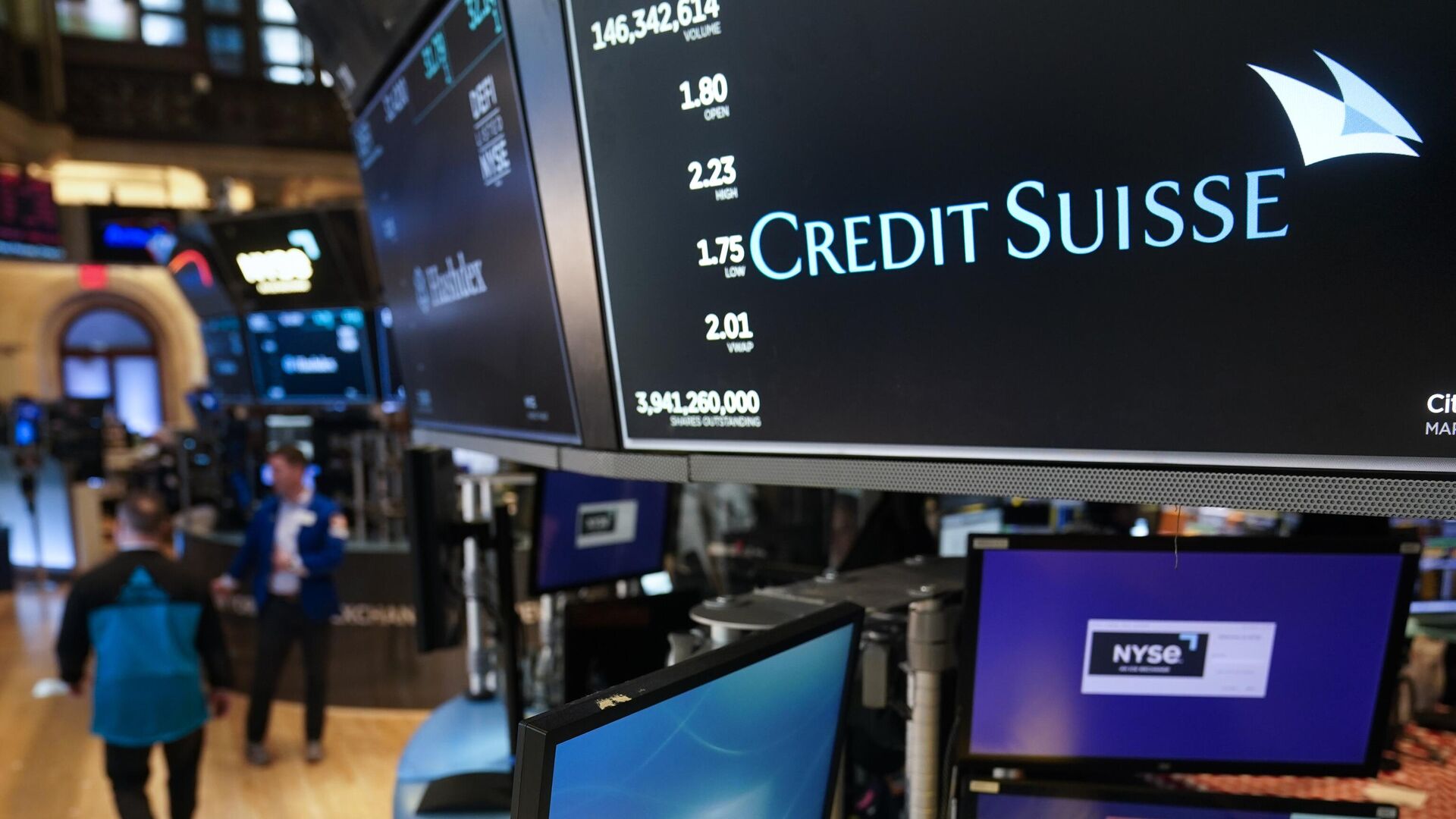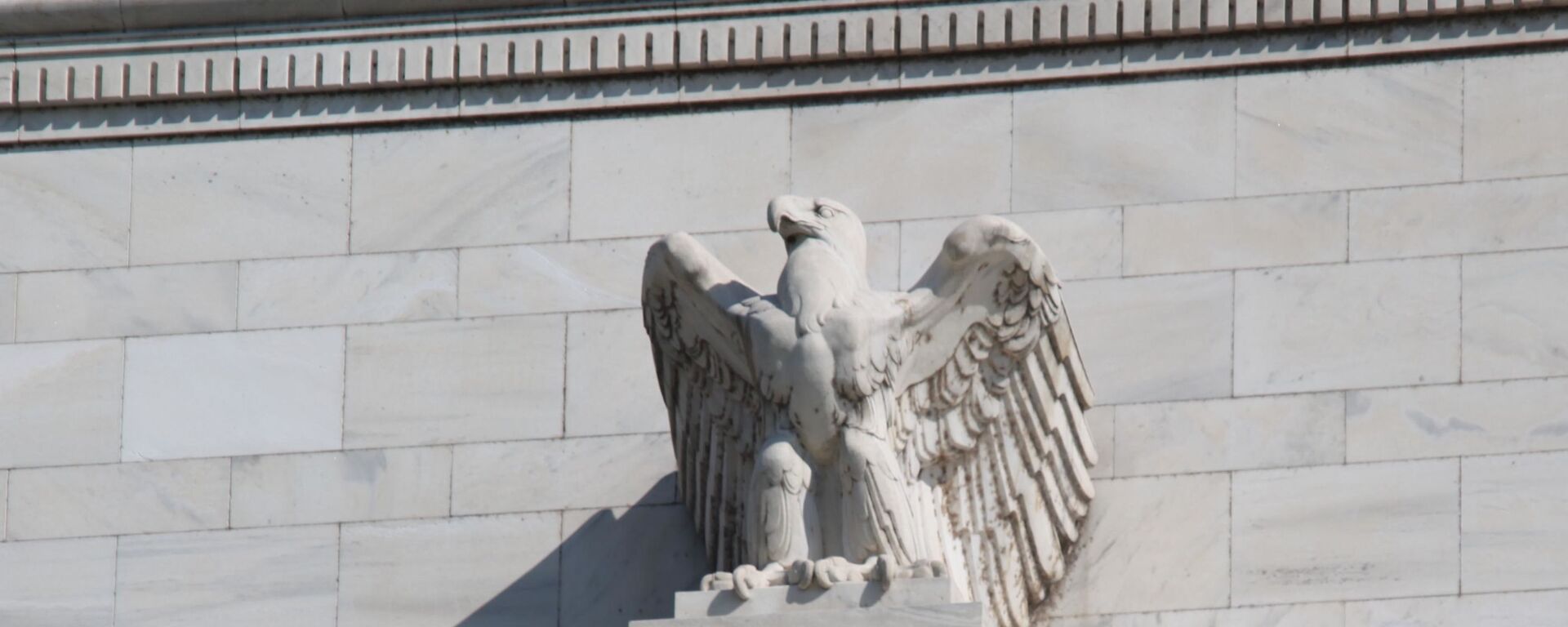https://sputnikglobe.com/20230315/credit-suisses-backer-refuses-bailout-as-banking-crisis-goes-global-triggering-widespread-selloffs-1108425793.html
Domino Effect? Credit Suisse Shares Plunge
Domino Effect? Credit Suisse Shares Plunge
Sputnik International
Despite early assurances that the collapse of the California-based Silicon Valley Bank would be an isolated incident and not the start of a new financial... 15.03.2023, Sputnik International
2023-03-15T15:42+0000
2023-03-15T15:42+0000
2023-03-15T15:58+0000
world
credit suisse group ag
banking
crisis
financial crisis
https://cdn1.img.sputnikglobe.com/img/07e7/03/0f/1108425646_0:0:3072:1728_1920x0_80_0_0_655b4aba6a7b9de015db86eefdeac13e.jpg
Shares in the Zurich-based bank collapsed on Wednesday after Saudi National Bank, its chief investor, refused to provide it with financial assistance, setting off a wave of losses across the continent.A day prior, Credit Suisse said in its annual report for 2022 that it had identified "material weaknesses" in its controls over financial reporting, prompting new worries about the long-suffering bank. Credit Suisse posted its largest annual loss last year since the 2008 financial crash, and its shares have lost 80% of their value over the last two years.The crisis quickly began to spread across European financial institutions, with France’s BNP Paribas, Europe’s second-largest banking group losing more than 10% of its value. Societe Generale, Spain’s Banco de Sabadell, Germany’s Commerzbank, and the Italian banks UniCredit, FinecoBank, and Monte dei Paschi all saw massive share selloffs on Wednesday as well.First Republic saw its shares fall by 61% on Monday before rebounding on Tuesday, then losing 15% by midday Wednesday. However, its shares were still worth just one-third what they had been on Thursday, before the banking crisis was set in motion by the collapse and nationalization of Silicon Valley Bank, the 18th-largest US bank, on Friday.Other factors also hurt markets on Wednesday, including a decline in retail sales in the US and persistent anxiety about the Federal Reserve’s coming interest rate hike. Such hikes were directly implicated in SVB’s collapse, as its devalued bonds resulted in the bank having less cash than it had believed. Petroleum prices also declined, with West Texas Intermediate (WTI) falling before $70 a barrel for the first time since late 2021, and Norway’s Brent Crude falling to $74 a barrel - a 13% decline since Monday.
https://sputnikglobe.com/20230315/more-banks-may-collapse-if-fed-continues-raising-interest-rate-analysts-say-1108408199.html
Sputnik International
feedback@sputniknews.com
+74956456601
MIA „Rossiya Segodnya“
2023
News
en_EN
Sputnik International
feedback@sputniknews.com
+74956456601
MIA „Rossiya Segodnya“
Sputnik International
feedback@sputniknews.com
+74956456601
MIA „Rossiya Segodnya“
credit suisse group ag, banking, crisis, financial crisis
credit suisse group ag, banking, crisis, financial crisis
Domino Effect? Credit Suisse Shares Plunge
15:42 GMT 15.03.2023 (Updated: 15:58 GMT 15.03.2023) Despite early assurances that the collapse of the California-based Silicon Valley Bank would be an isolated incident and not the start of a new financial crisis, confidence in financial institutions around the world has nonetheless been shaken and dozens of major banks have lost huge amounts of value in less than a week’s time.
Shares in the Zurich-based bank collapsed on Wednesday after Saudi National Bank, its chief investor, refused to provide it with financial assistance, setting off a wave of losses across the continent.
A day prior, Credit Suisse said in its annual report for 2022 that it had identified "material weaknesses" in its controls over financial reporting, prompting new worries about the long-suffering bank. Credit Suisse posted its largest annual loss last year since the 2008 financial crash, and its shares have lost 80% of their value over the last two years.
In the wake of the news, Ammar Al Khudairy, the chairman of Saudi National Bank, the single largest investor in Credit Suisse, said his institution would "absolutely not" increase its stake to shore up the bank.
The crisis quickly began to spread across European financial institutions, with France’s BNP Paribas, Europe’s second-largest banking group losing more than 10% of its value. Societe Generale, Spain’s Banco de Sabadell, Germany’s Commerzbank, and the Italian banks UniCredit, FinecoBank, and Monte dei Paschi all saw massive share selloffs on Wednesday as well.
US stocks suffered as well, with the Dow Jones down by nearly 500 points at midday. Selloffs were driven by declining bank stocks, with JPMorgan Chase, Citigroup, and First Republic all suffering big losses.
First Republic saw its shares fall by 61% on Monday before rebounding on Tuesday, then losing 15% by midday Wednesday. However, its shares were still worth just one-third what they had been on Thursday, before the banking crisis was set in motion by the
collapse and nationalization of Silicon Valley Bank, the 18th-largest US bank, on Friday.
Other factors also hurt markets on Wednesday, including a decline in retail sales in the US and persistent anxiety about the Federal Reserve’s coming interest rate hike. Such hikes were
directly implicated in SVB’s collapse, as its devalued bonds resulted in the bank having less cash than it had believed. Petroleum prices also declined, with West Texas Intermediate (WTI) falling before $70 a barrel for the first time since late 2021, and Norway’s Brent Crude falling to $74 a barrel - a 13% decline since Monday.



